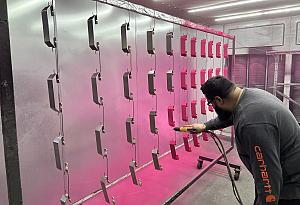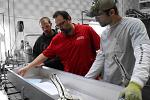- FMA
- The Fabricator
- FABTECH
- Canadian Metalworking
Categories
- Additive Manufacturing
- Aluminum Welding
- Arc Welding
- Assembly and Joining
- Automation and Robotics
- Bending and Forming
- Consumables
- Cutting and Weld Prep
- Electric Vehicles
- En Español
- Finishing
- Hydroforming
- Laser Cutting
- Laser Welding
- Machining
- Manufacturing Software
- Materials Handling
- Metals/Materials
- Oxyfuel Cutting
- Plasma Cutting
- Power Tools
- Punching and Other Holemaking
- Roll Forming
- Safety
- Sawing
- Shearing
- Shop Management
- Testing and Measuring
- Tube and Pipe Fabrication
- Tube and Pipe Production
- Waterjet Cutting
Industry Directory
Webcasts
Podcasts
FAB 40
Advertise
Subscribe
Account Login
Search
FMA economic analyst sees optimistic signs in 2011 for small manufacturing sector
- November 29, 2010
- News Release
- Shop Management
Dr. Chris Kuehl, economic analyst for the Fabricators & Manufacturers Association, Intl. (FMA), sees the "beginning stages for some optimism" in the small business community, which, in turn, indicate "solid" economic news for many U.S. manufacturers in 2011.
Kuehl said, "The small business community drives the economy and is vital to any sort of real recovery. In manufacturing the connection is even more obvious as 95 percent of manufacturers employ fewer than 500 workers and half run operations of less than 100 employees."
In the current FMA economic update newsletter Fabrinomics, Kuehl asserted there is a mood of optimism in the small business community, citing the National Federation of Small Business Optimism Index that rose by 2.7 points and now sits at 91.7.
"That is certainly progress and there are some movements in the sub-index that look more promising yet," he said. "There is an expectation that demand will increase as the expected sales increase jumped by 4 percentage points — marking the first positive movement in that sub category since the start of the recession in 2008." There also was an 11 percent gain in the index that marks expected business conditions in the next six months.
"That is consistent with some of the other elements, which indicate many in the small business community think 2011 will be what most of them had expected 2010 to be," Kuehl added. "There has even been some improvement in terms of the hiring index as it rose by 4 percent as well.
"None of this data suggests there is euphoria in the community, and the numbers are well below what used to be considered normal," he said. "In fact, the 91.7 reading is still in recession territory and that tells an important story as well. The bottom line is that conditions are improving but slowly, and there is no real sense that there will be dramatic recovery much before the end of next year — at the earliest."
Kuehl stressed three factors must occur in the small business community for a recovery to take place. Most critically, consumer demand must return. In addition, businesses need access to capital to meet that expanded need, and business owners will require a semi-predictable environment in order to plan how to grow their businesses.
"Small business owners are well aware they hold the key to the most important priority," he explained. "They know they are the major employers in the economy and they know that their employees are other people's consumers. They would love to start hiring and feeding the economy with all those eager employees but there is nothing they can do on their own.
"It is the same Catch-22 dilemma the economy as a whole has faced for the past three years," Kuehl said. "The only potential shift in this conversation takes place when one broadens the concept of consumer and looks outside the traditional avenues of demand. The lure of the global consumer is strong and there is much evidence to show those companies that can take advantage of the global markets will be the ones to grow.
"More opportunities exist for manufacturers in this area — the steel fabricating shop in Ohio may be able to sell to the rest of the world, but the dry cleaner in Las Vegas isn't going to have that option."
In regards to capital, the financial sector will see some significant changes and some of those will clearly make the system more accountable, according to Kuehl.
In terms of the regulatory environment, Kuehl stated, "There is nothing that even comes close to consensus on this subject. For every small business that feels hampered by regulation and control, there is another one that will directly benefit from that rule or regulation."
Kuehl noted that because the majority of manufacturers are small business people, they have the same basic issues as others in that community. "The fact that there has been movement in the overall sector demonstrates that some of the effort to increase economic activity is starting to bear fruit," he said.
"For the vast majority of manufacturers in the U.S. these other small businesses are their consumers — directly and indirectly," Kuehl added. “It is solid news that there has been a change in attitude — at least the beginning stages of some optimism. If this holds for a few more months, it will be appropriate to get more excited about that build in confidence."
Based in Rockford, Ill., the Fabricators & Manufacturers Association, Intl. (FMA), is a professional organization with more than 2,100 members working together to improve the metal forming and fabricating industry. Founded in 1970, FMA brings metal fabricators and fabricating equipment manufacturers together through technology councils, educational programs, networking events, industry trade publications including The FABRICATOR®, and the FABTECH trade show. FMA also has a technology affiliate, the Tube & Pipe Association, Intl. (TPA), which focuses on the unique needs of companies engaged in tube and pipe producing and fabricating.
Related Companies
subscribe now

The Fabricator is North America's leading magazine for the metal forming and fabricating industry. The magazine delivers the news, technical articles, and case histories that enable fabricators to do their jobs more efficiently. The Fabricator has served the industry since 1970.
start your free subscription- Stay connected from anywhere

Easily access valuable industry resources now with full access to the digital edition of The Fabricator.

Easily access valuable industry resources now with full access to the digital edition of The Welder.

Easily access valuable industry resources now with full access to the digital edition of The Tube and Pipe Journal.
- Podcasting
- Podcast:
- The Fabricator Podcast
- Published:
- 04/16/2024
- Running Time:
- 63:29
In this episode of The Fabricator Podcast, Caleb Chamberlain, co-founder and CEO of OSH Cut, discusses his company’s...
- Industry Events
16th Annual Safety Conference
- April 30 - May 1, 2024
- Elgin,
Pipe and Tube Conference
- May 21 - 22, 2024
- Omaha, NE
World-Class Roll Forming Workshop
- June 5 - 6, 2024
- Louisville, KY
Advanced Laser Application Workshop
- June 25 - 27, 2024
- Novi, MI






























